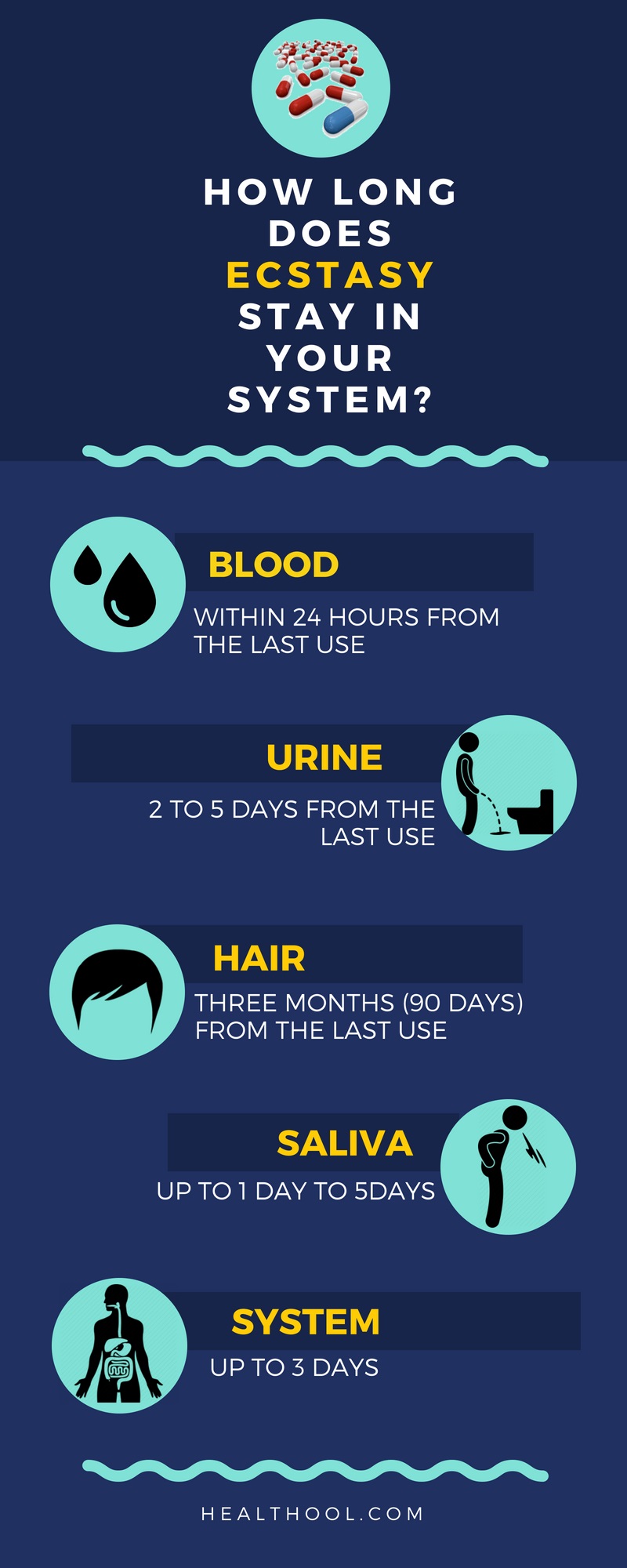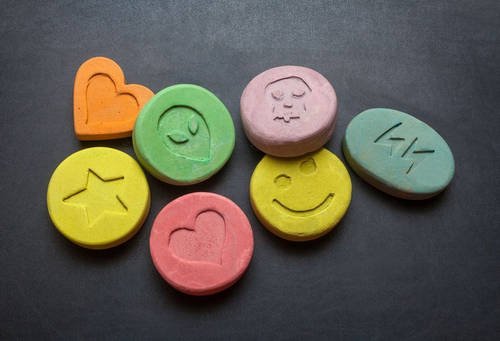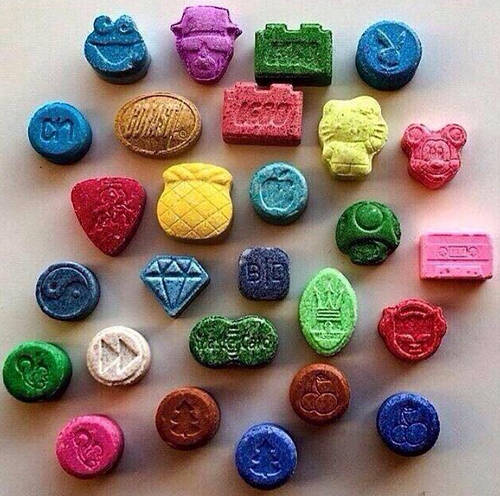How long does Ecstasy stay in your system?
Last reviewed by Dr. Raj MD on January 12th, 2022.
There are various types of controlled, prohibited, or illicit substance and one of them is ecstasy. Ecstasy is medically known as MDMA, but it is also popular by the street names like Molly and E.
Although, it is illegal, many people still use it for recreational purpose because of its mild hallucinogenic and stimulant properties. Ecstasy is a party drug which produces psychoactive effects and is available in various forms such as tablets, capsules, powder, and liquid. (1, 2, 3)
How long does Ecstasy stay in your system – infographic


Image 1: Colorful tablets, which looks like candy but are actually ecstasy.
Picture Source: www.popsci.com

Picture 2: Ecstasy tablets in various forms, shapes, colors, and sizes.
Photo Source: newsinfo.inquirer.net
How is ecstasy metabolize in the body?
Ecstasy, when taken by mouth, may take about two hours to reach its maximum blood concentration. It is secreted into the urine and will remain there for two days and may linger for months in the hair follicles. (2, 3)
What are the effects of ecstasy in the body?
Ecstasy causes a euphoric high. It is the addicting effect that many people crave for. How long does ecstasy take to wear off? The recreational effect/euphoric high lasts for about three to six hours. The drug’s half-life is approximately seven hours. During such time, the effect of ecstasy gradually wears off, which causes the addict to try to take more to maintain the desired effect of the drug. Ecstasy produces adverse effects, which might last for a day. These include:
- Nausea
- Blurring of vision
- Muscle cramps
- Drying of the mouth
- Profuse sweating
- Clenching of the teeth
- Irritability/mood swings
- Aggressive behavior
- Trouble sleeping
- Anxiety
- Decreased appetite (fluttering in stomach)
The effect of ecstasy in the body primarily depends on the amount of ecstasy taken and severity of addiction. (2, 3, 4, 5)

Photo 3: Ecstasy can be extremely dangerous to one’s health and well-being.
Image Source: userfiles.steadyhealth.com
How to use ecstasy?
Ecstasy is usually available in the pill form and taken via the oral route. Being a party drug, the pill is sold with a character imprinted on it. You can also buy ecstasy in liquid form.
Why is ecstasy called a party drug? It is called a party drug because users often take it in social situations such as when attending a music festival, dance club, or any social situation that requires you to be up all night. However, one should be extremely cautious when it comes to using ecstasy as it causes the body temperature to rise leading to dehydration and dangerously high body temperature. (5, 6, 7)
The addicting effect of ecstasy
People who have been taking ecstasy for recreational purpose reported a feeling of relaxation and euphoria. It increases one’s energy and confidence and lowers inhibition and fatigue. However, prolonging the use of ecstasy can lead to dependency, addiction, and even death. It affects the quality of life because it can lead to bizarre behavior and permanent brain damage. (6, 7)
How long does ecstasy stay in your system?
There are various testing procedures used to detect how long ecstasy stays in your system. They include the following:
- Urine Test – How long does ecstasy stay in the urine? There are various factors that can greatly affect the ability of ecstasy to stay in the urine such as the amount of drug taken, the frequency of use, metabolism, and the patient’s health condition. On an average, ecstasy remains in the urine for two to five days after the last use.
- Blood Test – How long does ecstasy stay in the blood? In a routine blood test, ecstasy can be detected within 24 hours of using it. However, it has the shortest window of detection. If you want to find out if a person has recently used ecstasy, then a blood test is the best drug testing procedure to use. It is a bit invasive though as it requires pricking the skin to extract blood. On the other hand, a blood test is not that reliable when it comes to detecting chronic drug abuse.
- Hair follicle test – If you want to detect chronic drug abuse, then a hair follicle test is the best testing procedure as it can detect drug use for up to 90 days or three months. The reason why it is rarely used is that it is expensive. (6, 7, 8, 9)
| Blood test | Within 24 hours from the last use |
| Urine test | Two to five days from the last use |
| Hair follicle test | Three months (90 days) from the last use |
Want to know (How long does LSD stay in your system?)
How to get rid of ecstasy from your system?
Ecstasy can be traced in the routine drug test. If you have been using ecstasy and you are about to undergo a drug testing procedure, then it is a must to do things that can help get rid of ecstasy faster than the usual. These methods are tested and proven effective in helping the body get rid of ecstasy the soonest time possible.
- Hydrate – It would help a lot if you are going to drink plenty of water as it makes you urinate more often. It lessens the possibility of detecting ecstasy in the urine.
- Natural juices – Fruit juices such as cranberry juice can help remove toxins from the body and it includes illegal substances and alcohol. It is the natural way to detoxify the body.
- Detox products – there are readily available detox drinks that can help eliminate toxins from the body. Be very careful though and make sure that it is not only effective but also safe.
The best way to test negative for ecstasy and other forms of illicit drugs is to not take it at all. Addiction is a serious thing. In fact, it is a form of disease and proper treatment should be given to the patient. If addiction is not managed and cured, it could lead to self-destruction and could also affect the patient’s relationship with the significant others and the society as a whole.
Today, there are a lot of institutions that help the patient and their immediate family in managing dependency and addiction. There are also organizations that provide moral support to patients and their immediate family. (1, 8, 9, 10)
Disclaimer: Ecstasy is an illegal drug and should not be used by any means. The purpose of this article is to draw awareness and information about ecstasy and its harmful effects on the body. We do not sell or promote the use of ecstasy or any other illegal drugs. The sole purpose of this article is for education and awareness. Let this article be a guide to come up with healthy life choices. Illegal drugs are bad for your health and could even cause your life and your significant others. Avoid illegal drugs by all means.
References:
- https://www.verywellmind.com/how-long-does-ecstasy-stay-in-your-system-80255
- https://newlifehouse.com/how-long-does-ecstasy-stay-in-your-system/
- http://www.drugs.ie/drugs_info/about_drugs/how_long_do_drugs_stay_in_your_system/
- https://mentalhealthdaily.com/2015/10/12/how-long-does-ecstasy-mdma-stay-in-your-system/
- http://drug.addictionblog.org/how-long-does-xtc-stay-in-your-system/
- http://www.passadrugtestingforall.com/long-will-ecstasy-stay-system-a-6.html
- https://medicalfoxx.com/how-long-mdma-stay-system-urine-saliva.html
- https://www.blvdcenters.org/ecstasy-rehab-treatment-centers/how-long-does-mdma-stay-in-system
- https://georgiadrugdetox.com/resources/how-long-does-ecstasy-stay-in-your-system/
- http://www.addictionrehabcenters.com/drug-addiction/ecstasy-mdma-abuse-and-addiction/how-long-does-ecstasy-mdma-stay-in-your-system/